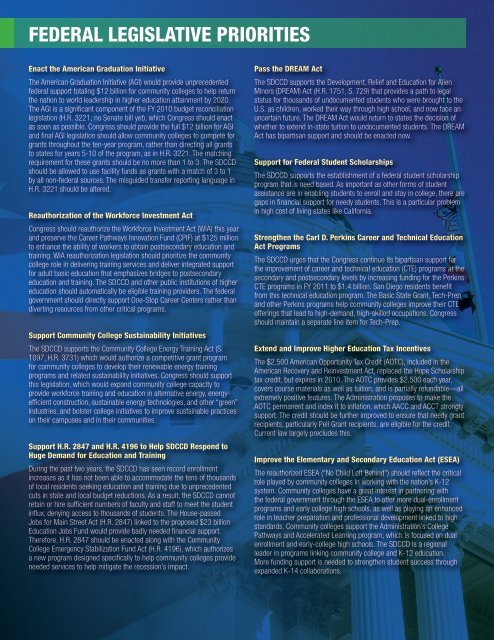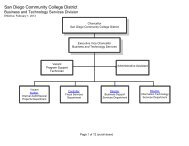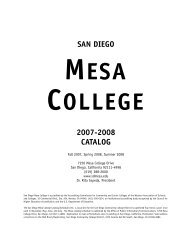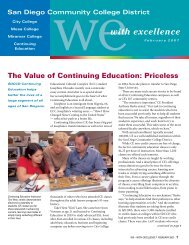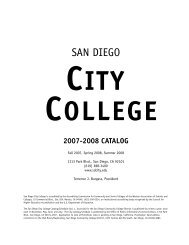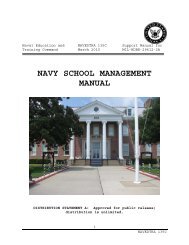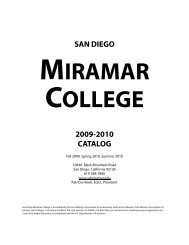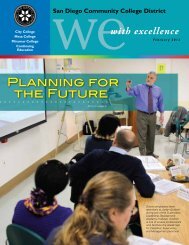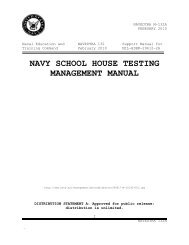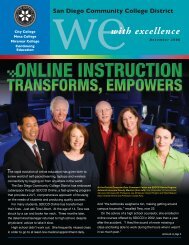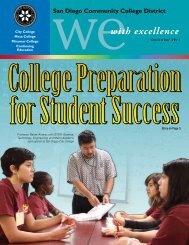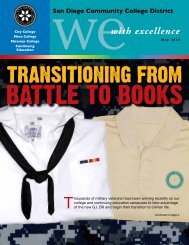Legislative Agenda
Legislative Agenda - San Diego Community College District
Legislative Agenda - San Diego Community College District
- No tags were found...
You also want an ePaper? Increase the reach of your titles
YUMPU automatically turns print PDFs into web optimized ePapers that Google loves.
FEDERAL LEGISLATIVE PRIORITIES<br />
Enact the American Graduation Initiative<br />
The American Graduation Initiative (AGI) would provide unprecedented<br />
federal support totaling $12 billion for community colleges to help return<br />
the nation to world leadership in higher education attainment by 2020.<br />
The AGI is a significant component of the FY 2010 budget reconciliation<br />
legislation (H.R. 3221; no Senate bill yet), which Congress should enact<br />
as soon as possible. Congress should provide the full $12 billion for AGI<br />
and final AGI legislation should allow community colleges to compete for<br />
grants throughout the ten-year program, rather than directing all grants<br />
to states for years 5-10 of the program, as in H.R. 3221. The matching<br />
requirement for these grants should be no more than 1 to 3. The SDCCD<br />
should be allowed to use facility funds as grants with a match of 3 to 1<br />
by all non-federal sources. The misguided transfer reporting language in<br />
H.R. 3221 should be altered.<br />
Reauthorization of the Workforce Investment Act<br />
Congress should reauthorize the Workforce Investment Act (WIA) this year<br />
and preserve the Career Pathways Innovation Fund (CPIF) at $125 million<br />
to enhance the ability of workers to obtain postsecondary education and<br />
training. WIA reauthorization legislation should prioritize the community<br />
college role in delivering training services and deliver integrated support<br />
for adult basic education that emphasizes bridges to postsecondary<br />
education and training. The SDCCD and other public institutions of higher<br />
education should automatically be eligible training providers. The federal<br />
government should directly support One-Stop Career Centers rather than<br />
diverting resources from other critical programs.<br />
Support Community College Sustainability Initiatives<br />
The SDCCD supports the Community College Energy Training Act (S.<br />
1097, H.R. 3731) which would authorize a competitive grant program<br />
for community colleges to develop their renewable energy training<br />
programs and related sustainability initiatives. Congress should support<br />
this legislation, which would expand community college capacity to<br />
provide workforce training and education in alternative energy, energyefficient<br />
construction, sustainable energy technologies, and other “green”<br />
industries, and bolster college initiatives to improve sustainable practices<br />
on their campuses and in their communities.<br />
Support H.R. 2847 and H.R. 4196 to Help SDCCD Respond to<br />
Huge Demand for Education and Training<br />
During the past two years, the SDCCD has seen record enrollment<br />
increases as it has not been able to accommodate the tens of thousands<br />
of local residents seeking education and training due to unprecedented<br />
cuts in state and local budget reductions. As a result, the SDCCD cannot<br />
retain or hire sufficient numbers of faculty and staff to meet the student<br />
influx, denying access to thousands of students. The House-passed<br />
Jobs for Main Street Act (H.R. 2847) linked to the proposed $23 billion<br />
Education Jobs Fund would provide badly needed financial support.<br />
Therefore, H.R. 2847 should be enacted along with the Community<br />
College Emergency Stabilization Fund Act (H.R. 4196), which authorizes<br />
a new program designed specifically to help community colleges provide<br />
needed services to help mitigate the recession’s impact.<br />
Pass the DREAM Act<br />
The SDCCD supports the Development, Relief and Education for Alien<br />
Minors (DREAM) Act (H.R. 1751, S. 729) that provides a path to legal<br />
status for thousands of undocumented students who were brought to the<br />
U.S. as children, worked their way through high school, and now face an<br />
uncertain future. The DREAM Act would return to states the decision of<br />
whether to extend in-state tuition to undocumented students. The DREAM<br />
Act has bipartisan support and should be enacted now.<br />
Support for Federal Student Scholarships<br />
The SDCCD supports the establishment of a federal student scholarship<br />
program that is need based. As important as other forms of student<br />
assistance are in enabling students to enroll and stay in college, there are<br />
gaps in financial support for needy students. This is a particular problem<br />
in high cost of living states like California.<br />
Strengthen the Carl D. Perkins Career and Technical Education<br />
Act Programs<br />
The SDCCD urges that the Congress continue its bipartisan support for<br />
the improvement of career and technical education (CTE) programs at the<br />
secondary and postsecondary levels by increasing funding for the Perkins<br />
CTE programs in FY 2011 to $1.4 billion. San Diego residents benefit<br />
from this technical education program. The Basic State Grant, Tech-Prep<br />
and other Perkins programs help community colleges improve their CTE<br />
offerings that lead to high-demand, high-skilled occupations. Congress<br />
should maintain a separate line item for Tech-Prep.<br />
Extend and Improve Higher Education Tax Incentives<br />
The $2,500 American Opportunity Tax Credit (AOTC), included in the<br />
American Recovery and Reinvestment Act, replaced the Hope Scholarship<br />
tax credit, but expires in 2010. The AOTC provides $2,500 each year,<br />
covers course materials as well as tuition, and is partially refundable—all<br />
extremely positive features. The Administration proposes to make the<br />
AOTC permanent and index it to inflation, which AACC and ACCT strongly<br />
support. The credit should be further improved to ensure that needy grant<br />
recipients, particularly Pell Grant recipients, are eligible for the credit.<br />
Current law largely precludes this.<br />
Improve the Elementary and Secondary Education Act (ESEA)<br />
The reauthorized ESEA (“No Child Left Behind”) should reflect the critical<br />
role played by community colleges in working with the nation’s K-12<br />
system. Community colleges have a great interest in partnering with<br />
the federal government through the ESEA to offer more dual-enrollment<br />
programs and early college high schools, as well as playing an enhanced<br />
role in teacher preparation and professional development linked to high<br />
standards. Community colleges support the Administration’s College<br />
Pathways and Accelerated Learning program, which is focused on dual<br />
enrollment and early-college high schools. The SDCCD is a regional<br />
leader in programs linking community college and K-12 education.<br />
More funding support is needed to strengthen student success through<br />
expanded K-14 collaborations.


